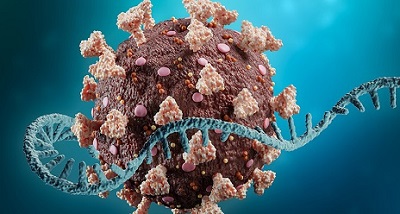COVID-19 News: Defective Or Mutated Host OSA Genes Found To Be Related To SARS-CoV-2 Induced Multisystem Inflammatory Syndrome In Children.
COVID-19 News - OAS Genes - MIS-C Feb 12, 2023 3 years, 1 week, 2 days, 17 hours, 59 minutes ago
COVID-19 News: A new international study led by researchers from the St. Giles Laboratory of Human Genetics of Infectious Diseases, Rockefeller Branch, The Rockefeller University, New York-USA HAS found Inborn errors of OAS–RNase L gene to be the cause behind SARS-CoV-2–related multisystem inflammatory syndrome in children.

This is not the first time that human OAS gene variants have been implicated in various COVID-19 issues.
Thailand Medical News in our past
COVID-19 News coverages have detailed various studies as to how the host OSA genes and its variants play a role in COVID-19 severity, in causing SARS-CoV-2 related heart failures and in increasing disease severity in diabetic kidney disease patients.
https://www.thailandmedical.news/news/university-of-college-london-study-shows-that-both-the-oas1-gene-is-a-risk-factor-for-both-alzheimer-s-disease-and-covid-19-severity
https://www.thailandmedical.news/news/covid-19-genetics-university-of-edinburgh-study-confirms-that-genes-are-critical-to-new-covid-19-treatments
https://www.thailandmedical.news/news/breaking-german-study-discovers-eight-human-proteins-and-genes-that-determine-covid-19-outcomes-with-the-elf5-gene-being-most-important
https://www.thailandmedical.news/news/covid-19-news-scientist-from-china-find-that-oas-genes-play-a-key-role-in-sars-cov-2-induced-heart-failure
https://www.thailandmedical.news/news/researchers-identify-hub-genes-stat1,-irf7,-isg15,-mx1,-and-oas1-that-increases-covid-19-severity-in-diabetic-kidney-disease-patients
It should also be noted that OAS gene defects or mutations are more predominant in the white Caucasian races and that certain phytochemicals can actually help rectify the issues. (Thailand Medical News has been conducting our own independent research in this area and have actually developed a therapeutic tea that causes epigenetic changes to rectify defects or issues of such OSA genes.)
MIS-C or multisystem inflammatory syndrome in children is a severe, unexplained complication of severe acute respiratory syndrome coronavirus 2 (SARS-CoV-2) infection with an estimated prevalence of ~1 per 10,000 infected children.
&nbs
p;
The condition typically manifests around 4 weeks after infection, without hypoxemic pneumonia.
Most affected children present with fever, rash, abdominal pain, myocarditis, and other clinical features reminiscent of Kawasaki disease, including lymphadenopathy, coronary aneurysm, and high levels of biological markers of acute inflammation.
Sustained monocyte activation is consistently reported as a key immunological feature of MIS-C. A more specific immunological abnormality is the polyclonal expansion of CD4+ and CD8+ T cells bearing the T cell receptor Vβ21.3. The root cause of MIS-C and its immunological and clinical features remains unknown.
The study team hypothesized that monogenic inborn errors of immunity to SARS-CoV-2 may underlie MIS-C in some children.
The study team further hypothesized that the identification of these inborn errors would provide insights into the molecular and cellular mechanisms underlying its immunological and clinical phenotypes.
The researchers also hypothesized that a genetic and mechanistic understanding of a few patients would provide a proof of principle that would facilitate studies in other patients.
The study team performed whole-exome or whole-genome sequencing on 558 internationally recruited patients with MIS-C (aged 3 months to 19 years).
The study team then searched for rare nonsynonymous biallelic variants of protein-coding genes, testing a hypothesis of genetic homogeneity.
The researchers found autosomal recessive deficiencies of OAS1 (2′-5′-oligoadenylate synthetase 1), OAS2, or RNase L (ribonuclease L) in five unrelated children of four different ancestries with MIS-C (~1% of our cohort).
However, there were no similar defects in a cohort of 1288 individuals (aged 6 months to 99 years) with asymptomatic or mild infection (P = 0.001) or 334 young patients (aged 0 to 21 years) with asymptomatic or mild infection or COVID-19 pneumonia (P = 0.046).
The exact estimated cumulative frequency of these defects in the general population was ~0.00013. The type I interferon (IFN)–inducible double-stranded RNA (dsRNA)–sensing proteins OAS1 and OAS2 generate 2′-5′-linked oligoadenylates (2-5A), which activate the antiviral single-stranded RNA (ssRNA)–degrading RNase L, particularly in mononuclear phagocytes.
It was found that consistent with the absence of pneumonia in these patients, epithelial cells and fibroblasts defective for this pathway restricted SARS-CoV-2 normally.
Interestingly, this contrasted with interferon alpha and beta receptor subunit 1 (IFNAR1)–deficient cells from patients prone to hypoxemic pneumonia without MIS-C.
It was also found that monocytic cell lines with genetic deficiencies of OAS1, OAS2, or RNase L displayed excessive inflammatory cytokine production in response to intracellular dsRNA.
Cytokine production by RNase L–deficient cells was impaired by melanoma differentiation-associated protein 5 (MDA5) or retinoic acid–inducible gene I (RIG-I) deficiency and abolished by mitochondrial antiviral-signaling protein (MAVS) deficiency.
Exogenous 2-5A suppressed inflammatory responses to these stimuli in control and OAS1-deficient cells but not in RNase L–deficient cells.
It was finally found that monocytic cell lines, primary monocytes, and monocyte-derived dendritic cells with genetic deficiencies of OAS1, OAS2, or RNase L displayed exaggerated inflammatory responses to SARS-CoV-2 as well as SARS-CoV-2–infected cells and their RNA.
The study findings show that autosomal recessive deficiencies of OAS1, OAS2, or RNase L in ∼1% of an international cohort of MIS-C patients.
Importantly, it was found that the cytosolic OAS–RNase L pathway suppresses RIG-I/MDA5–MAVS–mediated inflammation in dsRNA-stimulated mononuclear phagocytes. Single-gene recessive inborn errors of the OAS–RNase L pathway unleash the production of SARS-CoV-2–triggered inflammatory cytokines by mononuclear phagocytes, thereby underlying MIS-C.
The study findings were published in the peer reviewed journal: Science.
https://www.science.org/doi/10.1126/science.abo3627
MIS-C or multisystem inflammatory syndrome in children is a severe complication of severe acute respiratory syndrome coronavirus 2 (SARS-CoV-2) that affects one in 10,000 infected children.
The condition is reminiscent of Kawasaki disease and its etiology to date remains unknown till the emergence of this study findings.
This is the first study to have performed whole-exome and whole-genome sequencing on a cohort of MIS-C patients and uncovered autosomal-recessive deficiencies of OAS1, OAS2, or RNASEL in around 1% of the cohort.
These OAS genes are components of a signaling pathway that suppresses inflammation in double-stranded RNA–stimulated mononuclear phagocytes.
Hence, single-gene recessive inborn errors of the OAS–RNase L pathway can result in uncontrolled inflammatory cytokine production by mononuclear phagocytes after SARS-CoV-2 infection, potentially explaining the origins of MIS-C in some children.
For the latest
COVID-19 News, keep on logging to Thailand Medical News.
